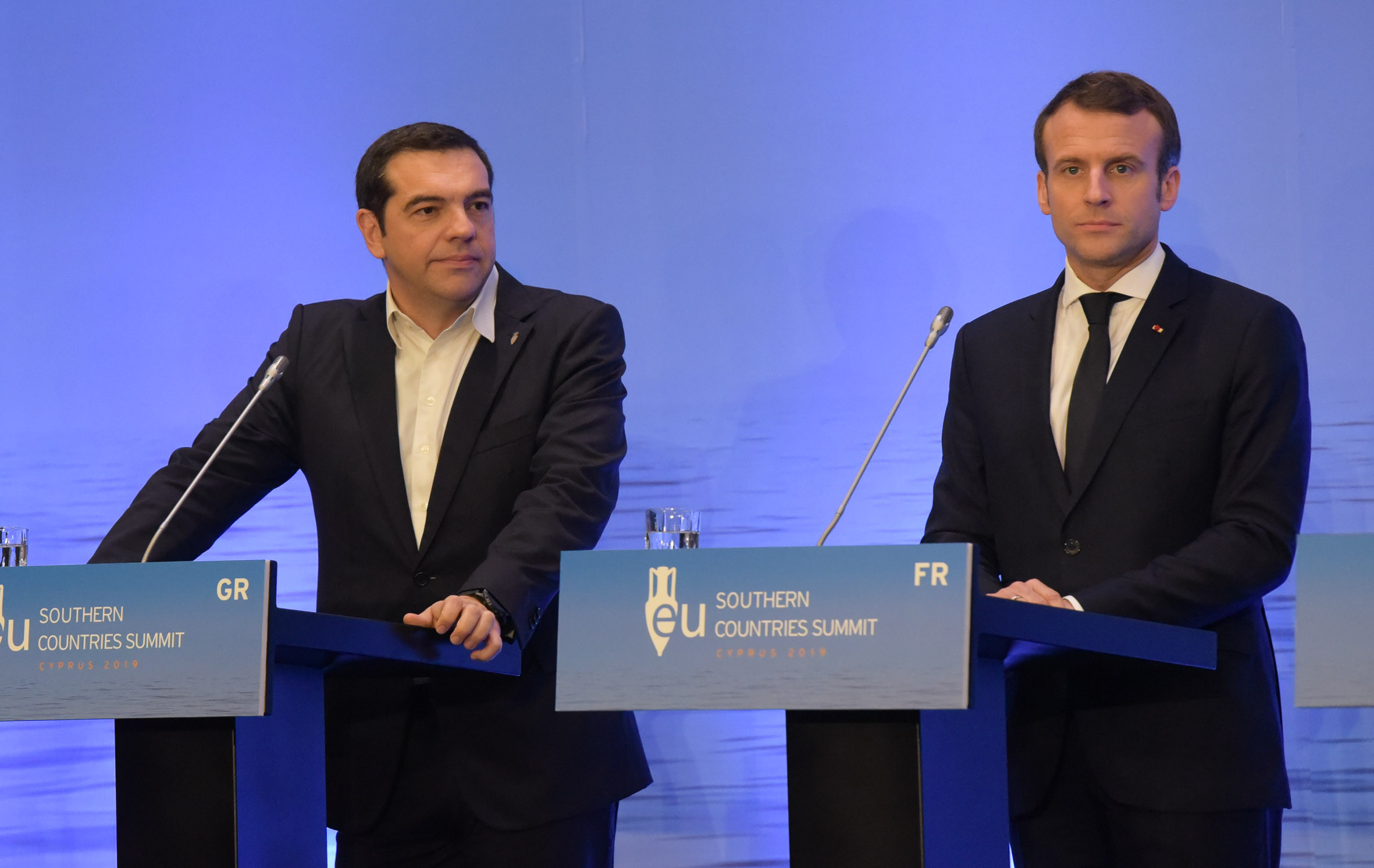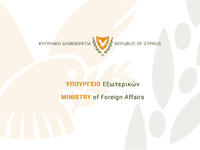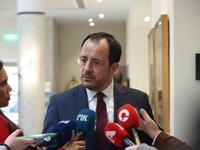Press Releases

29-01-2019 22:08
The Prime Minister of the Hellenic Republic, Mr Alexis Tsipras, made statements to the Press following the deliberations of the 5th Southern EU Countries Summit
The 5th Southern EU Countries Summit was held today, 29 January 2019, at the Filoxenia Conference Center, in Lefkosia. The Summit was hosted by the President of the Republic, Mr Nicos Anastasiades, with the participation of the President of the Republic of France, Mr Emmanuel Macron, the Prime Ministers of the Republic of Malta, Mr Joseph Muscat, the Hellenic Republic, Mr Alexis Tsipras, the Republic of Italy, Mr Giuseppe Conte, the Republic of Portugal, Me Antonio Costa, and the Minister of Foreign Affairs of the Kingdom of Spain, Mr Josep Borrell Fontelles.
Following the deliberations of the Summit, the six Heads of State and Government and the Minister of Foreign Affairs of the Kingdom of Spain, made statements to the Press.
Speaking in Greek, through interpretation in English, the Prime Minister of the Hellenic Republic, Mr Alexis Tsipras, said:
“I would like to thank the President of the Republic of Cyprus, President and friend Nicos Anastasiades, for the hospitality. I would also like to thank Emmanuel and all the colleagues who have said very nice words in this Summit for the importance success of Europe – that is how I see it – and not of Greece nor Northern Macedonia, of this very important resolution.
The most important piece of news for me today is that the seven of us meet again, almost a year later, and even more important is the fact that the South of Europe meets in the most South-eastern end of Europe, in Cyprus, and we send the message of unity, in spite of our political differences, to defend the fundamental European values, to defend the prospective of the European integration, to defend also the international law and to become a catalyst in the next time period in the developments in Europe, but also in the regional developments.
The southern EU countries undoubtedly have experienced in the previous time period, the most important crises of the EU: the economic crisis and the migration and refugee crisis.
Therefore, we have all the more reasons, and though our experience, to fight together, in order to face the regional inequalities within the EU, within the perspective of social convergences and convergences between the EU member-states, and we have all the more reasons to wish for the migration crisis to be tackled through the principles of solidarity and sharing responsibility, and not through a concept that says that we face our problems alone, especially when those problems do not concern each of us individually but the whole of the EU.
I believe firmly that the southern EU countries, especially in times where isolation prevails, nationalism prevails, where racism and xenophobia have become the leading political discourse can through the tradition and their culture and their objectives to send a message of cooperation and a message that there are European solutions to all the problems that we are facing.
I would like to speak a bit more about migration and the migration crisis. In all discussions that probably took the longest time, we underline the necessity for Europe to have a new joint asylum system, on the basis of solidarity and the fair sharing of responsibility, but we cannot speak of solidarity without practically expressing this, without creating a mechanism that shall reallocate the asylum seekers between the EU member states and therefore, it is an important priority for us the reform of the Dublin Regulation, and also to mention the future of the Eurozone and the required reforms; there, we agreed that during the next time period we must jointly struggle and fight and claim within the EU a Eurozone budget, the integration of the banking union as well as the tackling of social inequalities and meet for the creation of a European fund to tackle unemployment.
We discussed also the regional developments, how could we not – we are in Cyprus – we talked about Turkey, about the importance that cooperation and dialogue between the EU and Turkey in a series of areas - economy, migration, but also the developments in the Middle East.
I shall have the opportunity next week to visit Istanbul and meet President Erdogan, and apart from my own thought, I will, of course, bring to him the climate of the meeting here today, because all the seven of us here today agree that the relationships of each country separately and the EU with Turkey must be based on mutual respect and above all respect for international law. It is imperative that there is respect on behalf of Turkey as regards international law, both as regards the Eastern Mediterranean and the Aegean Sea.
Within this framework of course, it is understood that we all support the prospect of a just and viable solution to the Cyprus problem on the basis of the UN Resolutions and on the basis of the European acquis communautaire, which means that this solution cannot accept any interventions from third parties, or guarantees, or occupation armies. On the other hand, I want to underline that any solution must be and will be, and we fight for it, for the benefit of the entire Cypriot people, both Greek Cypriots and Turkish Cypriots, and I do believe that any benefits arising from the exploitation of natural resources, which is a sovereign right of the Republic of Cyprus and we underlined this repeatedly, must be equally and equitably shared between Greek Cypriots and Turkish Cypriots.
Of course, we talked about the energy situation and we are also are going to talk about this during dinner. I wanted to say that a greatly important from geopolitically point of view issue is the EastMed pipeline and I believe that this project is a project that must find all of us cooperating for its implementation and securing, I repeat, the safe transportation of energy resources from the Eastern Mediterranean to Europe, within the framework of the multiplicity of the sources and the energy corridors; a principle that we all support.
With these thoughts I would like once again to thank President Anastasiades, my friend Nicos, for his hospitality and to repeat that the message that we give here, today, is a message of joint course towards finding joint European solutions. The message that is given by our successful efforts regarding this agreement of thirty years for the name of Northern Macedonia is an example that dialogue and mutual understanding can bring about solutions. We believe in a Europe that can give solutions and of course, we believe in a Europe that will be more democratic and more social at the same time, and of course we believe in a Europe that shall be able, apart from solving its own problems, to play a substantial role on the international arena as a pillar of peace and stability, and I want to repeat the efforts made by all seven of us here, in Cyprus specifically, mark the fact that we are committed to work for peace and stability in the unstable area of Europe which is the South-eastern Mediterranean.”
(ML)
Relevant Press Releases

15-04-2024 14:04
The Ambassador of Cyprus to South Sudan presented her credentials

14-04-2024 12:45
Statements by the President of the Republic


11-04-2024 19:20
Official visit of the Foreign Minister of Andorra to Cyprus

09-04-2024 10:18
Statements by the President of the Republic


